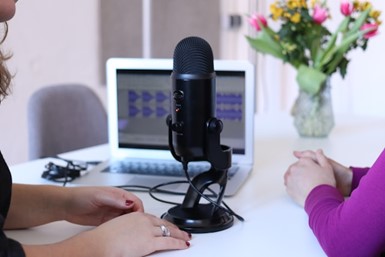Aaron Miller of Clarksville, TN hosts a popular podcast that streams on all platforms. In the following article, Aaron Ramon Miller explores key interviewing techniques for podcasts, offering detailed guidance on preparing for interviews, conducting them, and making the most of your guests.
Podcasts have become a popular medium for sharing stories, insights, and expertise with a wide audience. Central to any successful podcast is the ability to conduct engaging and informative interviews. Whether you’re interviewing industry experts, celebrities, or ordinary people with extraordinary stories, your interviewing technique can make or break the quality of your show for listeners.
Aaron Ramon Miller Details Preparing for the Interview
The success of an interview often depends on thorough preparation. This preparation involves researching your guest, planning your questions, and setting the right tone for the interview. Here are some essential steps to take before you start recording:
Research Your Guest
To conduct a meaningful interview, it’s crucial to understand your guest’s background, expertise, and interests. Research their professional achievements, personal stories, and any relevant work they’ve done. This knowledge will help you craft insightful questions and establish a strong connection with your guest.
Plan Your Questions
While it’s important to be flexible during an interview, having a basic outline of questions ensures that you cover the key topics you want to discuss. Aaron Ramon Miller suggests creating a list of open-ended questions that encourage your guest to share their experiences and insights. Avoid leading questions or those that require only a “yes” or “no” answer.
Set the Right Tone
Consider the tone and style of your podcast when preparing for the interview. Decide whether you want a formal or casual approach and ensure that your questions and demeanor align with that style. This consistency helps create a cohesive experience for your audience.
Test Your Equipment
Technical issues can disrupt an interview and affect the quality of your show. Test your recording equipment, microphones, and software to ensure everything is working correctly. Check your audio levels and make any necessary adjustments to prevent disruptions during the interview.
Communicate with Your Guest
Aaron Ramon Miller says that before the interview, communicate with your guest to provide them with details about the format, timing, and any specific topics you plan to cover. This communication helps put your guest at ease and ensures they know what to expect during the interview.
Conducting the Interview
Once you’re ready to start the interview, focus on creating a comfortable and engaging environment for your guest. Here are some key techniques to consider:
Start with an Icebreaker
Begin the interview with a simple icebreaker question or a casual conversation to help your guest relax. This approach sets a friendly tone and makes the transition to the main interview smoother.
Listen Actively
Active listening is critical to conducting a successful interview. Give your guest your full attention, maintain eye contact (if in person), and avoid interrupting them while they speak. Active listening helps you respond thoughtfully and ask follow-up questions based on your guest’s responses.
Be Flexible
While it’s essential to have a plan, be prepared to deviate from your list of questions if the conversation takes an interesting turn. Allow your guest to share unique stories and insights, even if they weren’t part of your initial plan. This flexibility can lead to more engaging and authentic content.
Use Open-Ended Questions
Open-ended questions encourage your guest to elaborate on their responses and share personal experiences. These questions often start with “how,” “why,” or “what,” prompting deeper discussion. For example, instead of asking, “Did you like the project?” ask, “What was your experience working on that project?”
 Create a Safe Space
Create a Safe Space
Ensure your guest feels comfortable and respected throughout the interview. Avoid controversial or sensitive topics unless they’ve been agreed upon in advance. Aaron Ramon Miller explains that if your guest shares something personal or emotional, respond with empathy and respect their boundaries.
Maintain a Steady Pace
Keep the interview flowing at a steady pace. If the conversation starts to slow down or become repetitive, use transition questions to move to a new topic. This technique helps maintain audience engagement and keeps the interview dynamic.
Summarize Key Points
At the end of the interview, summarize key points or ask your guest for any final thoughts. This summary helps wrap up the interview neatly and provides a sense of closure for your audience.
Post-Interview Best Practices
After the interview, there are a few additional steps to take to ensure a successful podcast episode:
Edit the Audio
Review the recording and edit out any background noise, awkward pauses, or irrelevant content. Focus on maintaining a smooth flow and ensuring the audio quality is clear and consistent.
Add Intro and Outro
Aaron Miller of Clarksville TN suggests creating an introduction and conclusion for your podcast episode. This segment can include a brief overview of the interview and thank your guest for their participation.
Promote the Episode
Once the episode is ready, promote it on social media and other platforms to reach a broader audience. Tag your guest and encourage them to share the episode with their network.
Follow Up
After the episode is released, follow up with your guest to thank them for their participation and ask for feedback. This follow-up helps build a positive relationship and opens the door for future collaborations.
Conclusion
Conducting effective interviews for podcasts requires careful planning, active listening, and the ability to adapt to the flow of the conversation. By preparing thoroughly, creating a comfortable environment for your guest, and using open-ended questions, you can make the most of your guest’s insights and experiences. These techniques not only lead to engaging podcast content but also foster meaningful connections with your guests, enriching your podcasting journey.








